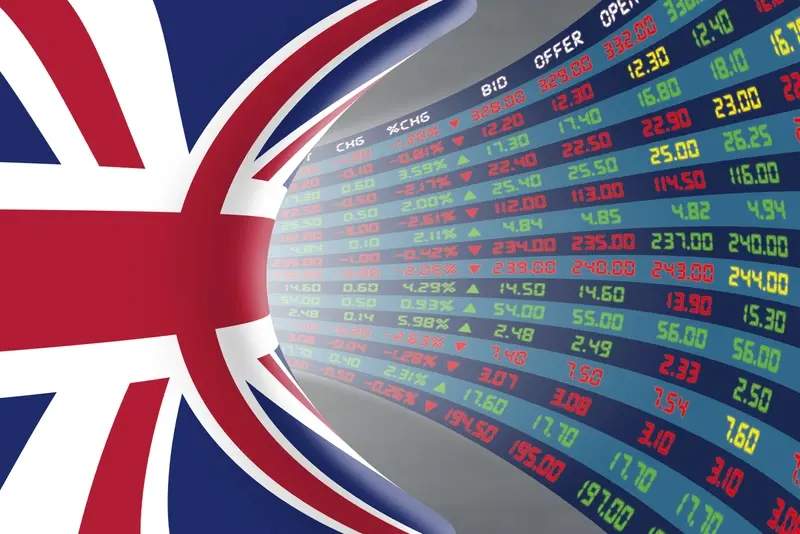
Stocks in London were largely lower on Friday, with rate-sensitive stocks on the back foot, as decent UK economic growth opened the way for more Bank of England hikes.
‘The UK economy continues to confound predictions of a recession for now. However, the words ’for now’ are doing plenty of heavy lifting,’ AJ Bell analyst Russ Mould commented.
‘The durability of the economy is a double-edged sword, as it may lead the Bank of England to keep taking a hard line on interest rates. Given the lagged impact of rate increases, which have already seen borrowing costs increase from near zero to more than 5% in a little over 18 months, this could result in a more significant downturn at some point down the line.’
The FTSE 100 index opened down 45.32 points, 0.6%, at 7,573.28. The FTSE 250 was down 35.44 points, 0.2%, at 18,958.37, and the AIM All-Share was up just 0.66 of a point, 0.1%, at 758.05.
The Cboe UK 100 was down 0.6% at 755.54, the Cboe UK 250 was 0.2% lower at 16,645.64, and the Cboe Small Companies was also down 0.2% at 13,567.57.
In European equities on Thursday, the CAC 40 in Paris was down 0.5%, while the DAX 40 in Frankfurt fell 0.3%.
According to the Office for National Statistics on Friday, the UK economy grew 0.2% quarter-on-quarter in the three months to June, following a 0.1% climb in the first-quarter. It easily topped the FXStreet-cited consensus, which had forecast the UK economy to flatline.
Year-on-year, the UK economy expanded 0.4%, beating expectations of a 0.2% climb, which was also the pace of annual growth in the first-quarter.
In June alone, there was chunky GDP growth beat. The economy rose 0.5%, shaking off the impact of industrial action, after an unrevised 0.1% decline in May and a 0.2% rise in April. An expansion of 0.2% was expected for June, according to FXStreet.
The data suggests the UK economy has so far resiliently withstood rate hikes from the Bank of England. With inflation still red-hot, running at 7.9% in June, it could mean more rate lifts are on the horizon.
The pound faded to $1.2709 shortly after the London equities open, down from $1.2728 at the close on Thursday, but up from $1.2683 before the UK GDP data was reported.
Fears of higher rates weighed on shares in housebuilder Persimmon, which was down 0.9%. Retailer JD Sports was 0.8% lower. A further rise in rates could mean less disposable income in the pockets of consumers.
The dollar was on the up on Friday morning. The euro faded to $1.0996 early Friday, down from $1.1014 at the European equities close on Thursday. Against the yen, the greenback climbed to JP¥144.64 from JP¥144.46.
In New York, the Dow Jones Industrial Average closed up 0.2% on Thursday. The S&P 500 closed flat and the Nasdaq Composite added 0.1%.
After starting the day strongly, and seeing a boost from a favourable inflation reading, equities in New York closed around session lows.
San Francisco Federal Reserve Bank President Mary Daly said while the fall in US inflation was good news, it is still too high, leaving the central bank with ‘more work to do’.
Speaking to Yahoo Finance, Daly said while the data is good news, ‘it is not a data point that says victory is ours. There’s still more work to do.’ Daly said she is highly data dependent and is reserving her judgment for how much work is needed to bring down inflation until the Fed’s September policy meeting, when she will pencil in her projections for interest rates.
Daly spoke after numbers showed the US yearly inflation rate accelerated to 3.2% in July, from 3.0% in June, snapping a streak of 12 successive slowdowns. The latest figure was shy of consensus, however, which had chalked in an acceleration to 3.3%, according to FXStreet.
In Tokyo, financial markets were closed for Mountain Day. The Shanghai Composite was down 1.3%, the Hang Seng in Hong Kong down 0.6%, and the S&P/ASX 200 in Sydney was 0.3% lower.
Back in London, Emis shot up 25%. UnitedHealth Group’s buy of the firm has been provisionally cleared by the UK’s competition watchdog.
The CMA explained that Optum, part of US healthcare firm UnitedHealth, currently supplies software used by general practitioners when prescribing medicines, as well as data analytics and advisory services that the NHS uses to help improve overall healthcare and health service provision.
The CMA said: ‘While the merging businesses do not supply competing services, Optum and its competitors use the data that Emis holds and integrate their own software with Emis’s electronic patient record system to compete in other markets, including the supply of population health management services and medicines optimisation software.’
The competition watchdog added that Emis, as the lead supplier to NHS GPs in the UK, ‘holds a particularly strong market position in the supply of electronic patient record systems but, further evidence-gathering and analysis found the combination of this position with Optum’s activities should not present competition concerns’.
The CMA’s phase 1 probe had found ‘initial concerns’ that the £1.24 billion takeover, which was agreed in June last year, would bring competition worries.
The CMA will report a final decision on October 5, with interested parties able to contact the CMA regarding the proposed merger until September 1.
GCP Asset Backed Income jumped 11%. FTSE 250-listed GCP Infrastructure lost 2.7%.
GCP Infrastructure Investments said it has agreed terms for a tie-up with GCP Asset Backed Income Fund and that it is also in talks for the enlarged group to possibly combine with RM Infrastructure Income.
The GCP Infrastructure and GCP Asset Backed Income combination will be conducted through a contractual scheme of reconstruction, resulting in a solvent winding-up of the latter. GCP Asset Backed Income assets will be transferred to GCP Infrastructure in exchange for new shares in the FTSE 250-listing.
GCP Infrastructure will continue to be advised by Gravis Capital Management after the tie-up but will propose some changes to its investment policy.
‘The board believes that, if completed, the GABI scheme will bring benefits to both the existing and any new shareholders in the company. The board has further proposed that, following the completion of the GABI scheme, there will be an increased return of capital to shareholders and the company will reduce its leverage. GCP Infra’s investment policy will be amended to maximise access to attractive investment opportunities, with a focus on sustainable assets,’ GCP Infrastructure said.
Any further tie-up with RM Infrastructure will also be effected through a scheme of reconstruction. A ‘material proportion’ of RMI assets will be transferred to GCP Infrastructure in exchange for new shares.
RMI, currently undergoing a strategic review, said it is also considering one other proposal it has received. RMI shares were 1.8% higher.
A cut from Deutsche Bank took a slice out of Domino’s Pizza Group shares. Deutsche cut the company to ’hold’ from ’buy’. Shares fell 1.1%.
Over in Zurich, UBS surged 4.3%. The bank said it has voluntarily ended a fr.9 billion, around $10.27 billion, loss protection agreement guaranteed by the Swiss government concerning its buy of Credit Suisse. It has also ended a fr.100 billion liquidity backstop with the Swiss National Bank.
‘The LPA would have covered a designated portfolio of Credit Suisse non-core assets. At the time, this was deemed necessary to protect UBS against potential tail risks as there had been very limited time to review respective assets over the rescue weekend. After reviewing all assets covered by the LPA since the closing in June and taking the appropriate fair value adjustments, UBS has concluded that the LPA is no longer required,’ UBS explained.
‘All loans under the PLB were fully repaid by Credit Suisse as of the end of May 2023. Following a comprehensive review of the funding situation, UBS has decided to voluntarily terminate the PLB agreement with the SNB as of 11 August 2023.’
Gold traded at $1,917.11 an ounce early Friday, up slightly from $1,916.01 at the European equities close on Thursday. A barrel of Brent oil fetched $86.60, down from $87.02.
Still to come on Friday’s economic calendar is a US producer price index reading at 1330 BST.
Copyright 2023 Alliance News Ltd. All Rights Reserved.




